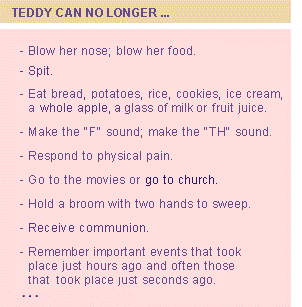

|

|

|

|

|

|


|
|Teddy's Case | Email | Feminocracy |



|

|

|

|

|

|


|

 Obviously insecure, she constantly called "baba", and she ran to her adoring father every few minutes to put her arms around him.
Obviously insecure, she constantly called "baba", and she ran to her adoring father every few minutes to put her arms around him.
- Put together from interviews and legal and medical documents, this is the story of a ravaged girl fallen victim to maternal cruelty, judicial irregularities and feminism run amok.
Teddy was born in Los Angeles on September 28, 1993, to Photius Coutsoukis, a 46-year-old Greek immigrant, and Susan Samora Coutsoukis, then 43. [detail1]
Teddy was a healthy, normal infant whose neonatal scores were above average. She had no known congenital defects and subsequent tests showed no genetic flaws.
Mr. Coutsoukis suspended a successful business career where he had previously made a six-figure income to care for their baby girl. He nicknamed her Houdini, because, he said, she was "extraordinarily intelligent and athletic".

|
 . .
|
In January 1994, Ms. Samora left the house, taking Teddy, and then evicted Mr. Coutsoukis with a family abuse restraining order. She placed Teddy in day care. Mr. Coutsoukis denied that he ever committed any violence and Dr. David Oas, the court ordered divorce evaluator, subsequently confirmed that in testimony.
Ms. Samora did not call back in response to my request for an interview.

 Less than a month later (with the mother having rescinded the restraining order) Mr. Coutsoukis was reunited with Teddy, only to find her catatonic and ill.
Less than a month later (with the mother having rescinded the restraining order) Mr. Coutsoukis was reunited with Teddy, only to find her catatonic and ill.
According to Toni Hulse, (the Coutsoukises' housekeeper who saw her a week later) Teddy was withdrawn and not her normal self and she had a runny nose. She had also lost weight, she was very pale and she barely moved. "I had never seen her sick before" said Hulse. Mrs. Hulse continued that after Mr. Coutsoukis's return and under his care, Teddy became her usual smiling, babbling happy self.
Mrs. Hulse, who worked for the Coutsoukis family from November 1993 to September 1994, said that she observed Mr. Coutsoukis making baby food for and feeding Teddy, changing her diapers, bathing her, and playing with her. She also stated that she could tell "he loves the child very much...He takes excellent care of the child. He is a loving and very conscientious father."
The housekeeper also described Mr. Coutsoukis as Teddy's primary care giver and she said that she rarely saw Ms. Samora (who was pursuing a career outside the home). Mrs. Hulse testified that she had never seen Teddy in poor condition before Mr. Coutsoukis left the family home that January. She said that Mr. Coutsoukis nursed her back to good health over the next few weeks.
 Hulse described Mr. Coutsoukis's situation as a difficult one. Ms. Samora had been hostile to him since Teddy's birth but the housekeeper said he took it in stride, not complaining but concentrating on his job as Teddy's 24-hour caretaker. He sometimes looked tired and overworked from having to stay up at night when Teddy awoke. Mr. Coutsoukis made "the greatest food" for Teddy, his spouse, Susan, and their guests. He also decorated the house with his art work and tended the flower garden in the spring and summer. This was Mr. Coutsoukis's "role" as the quiet, obedient, husband.
Hulse described Mr. Coutsoukis's situation as a difficult one. Ms. Samora had been hostile to him since Teddy's birth but the housekeeper said he took it in stride, not complaining but concentrating on his job as Teddy's 24-hour caretaker. He sometimes looked tired and overworked from having to stay up at night when Teddy awoke. Mr. Coutsoukis made "the greatest food" for Teddy, his spouse, Susan, and their guests. He also decorated the house with his art work and tended the flower garden in the spring and summer. This was Mr. Coutsoukis's "role" as the quiet, obedient, husband.
"I have always said that Teddy is a lucky girl to have Photius as a father," Hulse concluded.
Mr. Coutsoukis, who at one point informed me matter-of-factly that he possesses "arguably the highest IQ in America", complained about Teddy's poor treatment by her mother when it came to medical care. When Teddy needed a pediatric ophthalmologist, her father took her to Dr. Laurie Christianson of the Casey Eye Institute in Portland and to Dr. Craig Hoytt at the University of California San Francisco. They examined her gently without touching her or startling her. When her mother took her to a local ophthalmologist following Mr. Coutsoukis's eviction, she allowed the physician to put metal clamps on Teddy's eyelids in order to examine her as the mother restrained the agonizing 3-month old infant. That brutal ophthalmologist then sent a report to Mr. Coutsoukis stating that the baby was "uncooperative."

In July 1994 at 10 months of age (while on a visit to Greece) Teddy was diagnosed with serious developmental delays. Teddy was diagnosed by Dr. Helen Skouteli (a pediatric neurologist) who recommended a battery of tests including an EEG. Ms. Samora forbade her spouse to have the EEG performed, hampering early intervention into Teddy's medical problems. Mr. Coutsoukis meanwhile was reluctant to do anything that would antagonize his spouse, knowing the potentially catastrophic consequences of being separated from Teddy.
 Upon return from Greece, Mr. Coutsoukis sought and began physical therapy for Teddy. Ms. Samora again asked him to move out. Mr. Coutsoukis began caring for Teddy daily at his own apartment while his spouse worked.
Upon return from Greece, Mr. Coutsoukis sought and began physical therapy for Teddy. Ms. Samora again asked him to move out. Mr. Coutsoukis began caring for Teddy daily at his own apartment while his spouse worked.
On October 6, 1994 Ms. Samora filed a divorce petition in Oregon.
While Mr. Coutsoukis begged his wife to negotiate an amicable divorce, warning that a legal battle would be hurtful to Teddy and cause financial catastrophe, she had already retained a local attorney (he referred to her as a "child destroying slut") who refused all communication with him unless he retained a lawyer himself. Mr. Coutsoukis said that the lawyer, Christina Sanz, later on proceeded to "charm" his lawyer "into collusion". [Ms. Sanz moved into and began sharing this lawyer's office before the Oregon divorce hearing.]
While earning what amounts to an exceptionally high income for the area, Ms. Samora insisted that Mr. Coutsoukis go to work or never see Teddy again. While preferring to be a full-time stay-at-home parent, he started a home based business and hired a staff. He cared for Teddy in his new home from 8:00 a.m. until Ms. Samora picked up Teddy after work each day and oversaw her rehabilitation.
In August 1995 Ms. Samora observed three seizures in Teddy and finally had the EEG done at Rogue Valley Medical Center.
Teddy began receiving seizure medication prescribed by Dr. Helen
Skouteli, the pediatric neurologist who had first examined Teddy
13 months earlier.
A month later Ms. Samora unilaterally reduced the number
of hours Mr. Coutsoukis could care for Teddy in his home to every
weekday from 10:00 a.m. to 6:00 p.m. and just "his"
weekends or in other words, when she so decided.
In November 1996 (after nine months of resistance) Ms. Samora
finally relented and the parties began a court-ordered custody
evaluation of both parents and the child by Dr. David Oas (a licensed
clinical therapist, and a clinical psychologist with 25 years
of experience).
In February 1997 Dr. Oas indicated that he would recommend that
custody be given to Mr. Coutsoukis. He said that he based his
decision on "the strength of Teddy's biological and emotional
attachment to her father." He noted that "Teddy is an
at-risk child who has significant delays in development and that
I believe Mr. Coutsoukis is the best parent and best person to
provide in-home parental care of Teddy with his capacity to use
specific skill-building strategies to offset the significant behavioral
deficits she exhibits." He added that such in-home care is
preferable to out-of-home care for a child with Teddy's needs.
 Ms. Samora refused to undergo psychometric tests and denied
Dr. Oas access to her recent psychiatric records.
Ms. Samora refused to undergo psychometric tests and denied
Dr. Oas access to her recent psychiatric records.
In court ordered mediation, which Ms. Samora also resisted, in December
1996, an agreement was signed by which Mr. Coutsoukis gave his
estranged spouse temporary custody of Teddy provided that she
would spend her days with her father as was done previously. The
agreement also required that she would discuss educational and
medical decisions with the father before implementation.